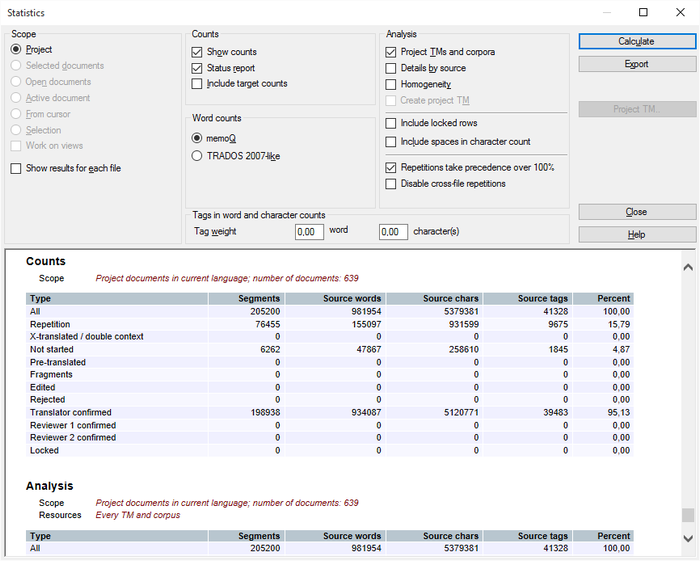|
You can run Statistics in the All languages mode for all target languages for your project. How to beginFor local projects, go to Project home and run Statistics on the Documents ribbon tab. For online projects, go to the Translations pane and run Statistics. In both cases, make sure you choose All languages in the Target language drop-down list. Caution: You might not be able to X-translate document in an online project while memoQ server is running an automated task on the same project. In this case, you will receive a message with the advice to wait a few minutes. This is not an error: you can continue with X-translation in a few minutes. UseAfter you ran statistics in the all language mode, the results list shows a multilingual statistics, i.e. a single summary table for counts and a single table for each documents, showing added up numbers for all target languages:
When you export the analysis, memoQ now adds a separate row for each target language document for the HTML and CSV (reflecting shown results) options. If you choose to export as CSV (per file, Trados-compatible) or CSV (per file, all information), memoQ will export a CSV with a prefix for each target language, e.g. [ger] sample.txt:
Note: When you run statistics in the all language mode in a local project, the option to create a Project TM is not available. No quoting in Language Terminal: In memoQ 2015 (build 7.8.100 or higher), multilingual projects cannot be recorded in Language Terminal. This restriction is temporary: Language Terminal project management capabilities will return in a future release of memoQ. Weighted counts in brackets: In the results, memoQ shows the weighted word count and the weighted character count in brackets. To get the weighted count, memoQ multiplies the word count (or character count) that falls under a certain match rate by the weight that belongs to that match rate. The weight is a percent number, and it is supposed to show how much work is needed on matches of that type. To set the weights in local projects, open Options, choose Miscellaneous, and click the Weighted counts tab. To set the weights in online projects, open Server Administrator, connect to the server, and choose Weighted counts. memoQ always uses the same weights for every project - until you change them.
|

